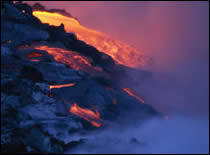Key Facts About Volcanic Eruptions
You can do many things to protect yourself and your family from the dangers a volcanic eruption can cause. The best way to protect yourself and your family is to follow the advice of local officials.
Major health threats from a volcanic eruption
 Volcanoes spew hot, dangerous gases, ash, lava, and rock that are powerfully destructive. People have died from volcanic blasts. The most common cause of death from a volcano is suffocation. Volcanic eruptions can result in additional threats to health, such as floods, mudslides, power outages, drinking water contamination, and wildfires. Health concerns after a volcanic eruption include infectious disease, respiratory illness, burns, injuries from falls, and vehicle accidents related to the slippery, hazy conditions caused by ash. When warnings are heeded, the chances of adverse health effects from a volcanic eruption are very low.
Volcanoes spew hot, dangerous gases, ash, lava, and rock that are powerfully destructive. People have died from volcanic blasts. The most common cause of death from a volcano is suffocation. Volcanic eruptions can result in additional threats to health, such as floods, mudslides, power outages, drinking water contamination, and wildfires. Health concerns after a volcanic eruption include infectious disease, respiratory illness, burns, injuries from falls, and vehicle accidents related to the slippery, hazy conditions caused by ash. When warnings are heeded, the chances of adverse health effects from a volcanic eruption are very low.
Volcanic ash
Exposure to ash can be harmful. Infants, elderly people, and people with respiratory conditions such as asthma, emphysema, and other chronic lung diseases may have problems if they breathe in volcanic ash. Ash is gritty, abrasive, sometimes corrosive, and always unpleasant. Small ash particles can abrade (scratch) the front of the eye. Ash particles may contain crystalline silica, a material that causes a respiratory disease called silicosis.
Gases
Most gases from a volcano quickly blow away. However, heavy gases such as carbon dioxide and hydrogen sulfide can collect in low-lying areas. The most common volcanic gas is water vapor, followed by carbon dioxide and sulfur dioxide. Sulfur dioxide can cause breathing problems in both healthy people and people with asthma and other respiratory problems. Other volcanic gases include hydrogen chloride, carbon monoxide, and hydrogen fluoride. Amounts of these gases vary widely from one volcanic eruption to the next.
Although gases usually blow away rapidly, it is possible that people who are close to the volcano or who are in the low-lying areas downwind may be exposed to levels that may affect health. At low levels, gases can irritate the eyes, nose, and throat. At higher levels, gases can cause rapid breathing, headache, dizziness, swelling and spasm of the throat, and suffocation.
Sources
For more information on volcanoes and health, see the following sources:
- American Red Cross
- Federal Emergency Management Agency
- U.S. Geological Survey
- Washington State Department of Health
Contact Us:
- Centers for Disease Control and Prevention
1600 Clifton Rd
Atlanta, GA 30333 - 800-CDC-INFO
(800-232-4636)
TTY: (888) 232-6348 - Contact CDC-INFO




